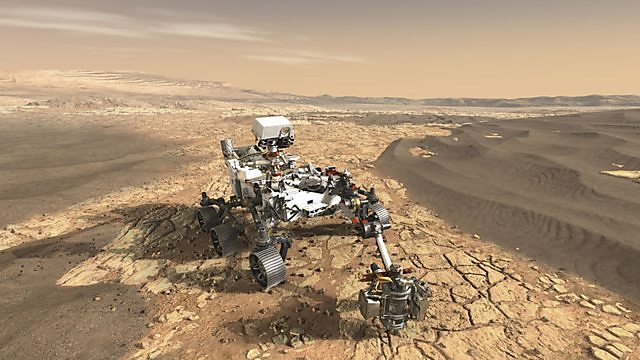Return to Mars
How will NASA’s latest robot rover Perseverance continue the search for life on Mars? NASA scientists and engineers preview the next great step in the quest on the Red Planet.
In February 2021, three spacecraft will arrive at Mars. One is the United Arab Emirates’ Hope orbiter - the first interplanetary probe sent by the Arab world. Tianwen-1 will be China’s first mission to reach Mars – an ambitious bid to put both a probe into orbit and a small robot on the Martian surface. But the most sophisticated of all is the United States’ Mars 2020 mission. If all goes well, it will land a car-sized robotic rover on the rocky floor of a vast crater that contained a lake more than 3.7 billion years ago. The rover, named Perseverance, will spend years surveying the geology of Jerezo crater and using a battery of new instruments to examine the rocks for any evidence that life existed in the ancient lake. It will also be the first mission to extract rock samples and package them up for eventual return to Earth, sometime in the 2030s. Andrew Luck-Baker talks to NASA’s deputy project scientist Katie Stack-Morgan and mission manager Keith Comeaux, planetary scientists Melissa Rice and Sanjeev Gupta, and astrobiologist Mark Sephton.
Last on
Clip
-
![]()
Nasa’s Mars landing will be ‘seven minutes of terror’
Duration: 03:28
Broadcasts
- Mon 7 Sep 2020 19:32GMT91�ȱ� World Service
- Tue 8 Sep 2020 03:32GMT91�ȱ� World Service
- Tue 8 Sep 2020 08:32GMT91�ȱ� World Service
- Tue 8 Sep 2020 12:32GMT91�ȱ� World Service
Space
The eclipses, spacecraft and astronauts changing our view of the Universe
The Curious Cases of Rutherford and Fry
Podcast
-
![]()
Discovery
Explorations in the world of science.




